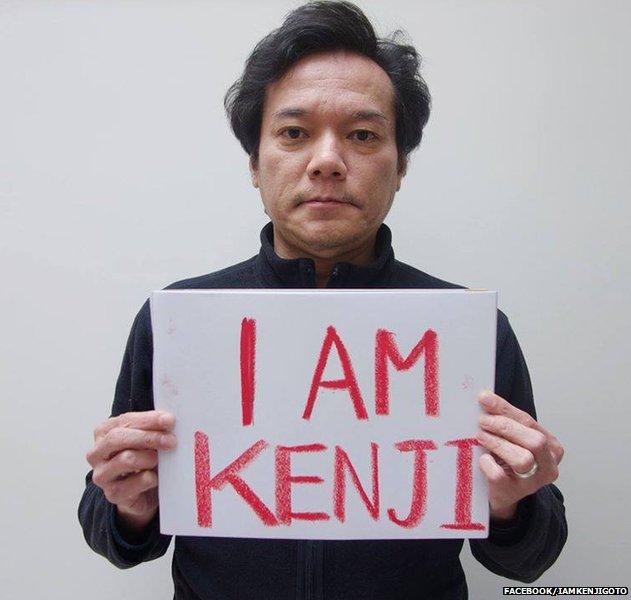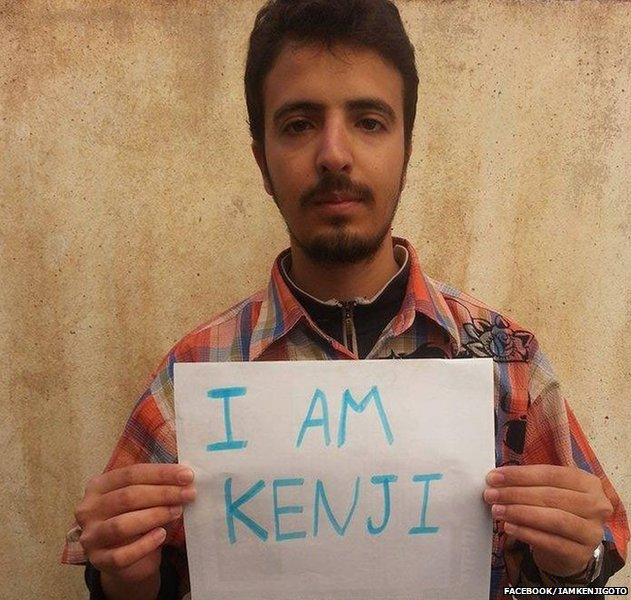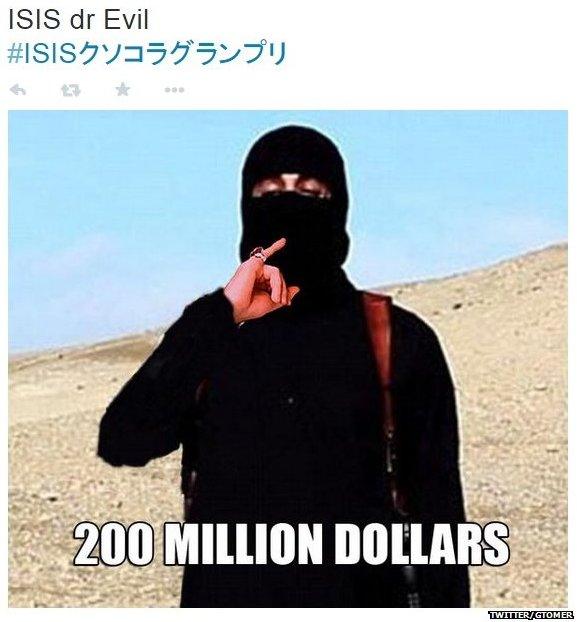#IamKenji: Fighting Islamic State with a hashtag
- Published

The friend of a Japanese journalist held by the Islamic State is calling for solidarity to secure his release
Japanese Facebook users are using the latest "Je Suis" spinoff hashtag to call for the release of a hostage held by Islamic State.
A friend of freelance journalist and documentary film-maker Kenji Goto, who was apparently pictured in a video released by IS, launched the "I am Kenji, external" Facebook page to appeal to both the Islamic State and the Japanese government "to avoid unjust murder." Japan is currently trying to verify a video declaring the murder of another Japanese hostage, Haruna Yukawa.
The page started by Taku Nishimae, the chief of a New York-based media production firm, has attracted more than 16,000 likes. It invites people to post a picture with a placard saying "I am Kenji" to express solidarity with the hostage. "Let's show that we're united, and tell that it's unjust to kill innocent citizens and it's meaningless to turn entire nation against you," Nishimae wrote, external.

Online messages have hailed the reporting career of Kenji Goto
"He's been a friend, advocate for the voiceless refugees for many years. He's been sending out the message of people on the ground. Killing him is killing the voice of people who's really suffering. He never took side for any nation nor any religion. He always took side for the people. Please Release Kenji."
Responses of solidarity have come in from countries as far afield as Canada, South Korea, India, Yemen and Mexico. "Let's prove to the world that Muslims are innocent of the ISIS actions. I'm Muslim, I'm Arab, and I'm Kenji," wrote one user, while another post simply said, "Please let him go HOME."
"Kenji made brilliant reports about war and post war conflict areas. He made humanity the core of his reports. All respect to this gallant man! #IAmKenji," read another Facebook post.
"If the Islamic State members see the messages posted on the page, they will realize how much Goto is loved by people around the world," Nishimae said, external about the intention behind the page, which was inspired by the huge response to the #JeSuisCharlie response to the Paris attacks.
Some users calling for the release of the hostages have also written #IAmNotAbe, external, a criticism directed at Prime Minister Shinzo Abe amid suspicion that the hostage situation might be used as a tool to change Japan's pacifist constitution. "Don't forget that many of the Japanese oppose the use of military force. #IAmNotAbe," wrote, external a user on Facebook.
Aside from these campaigns, Japanese Twitter users have also responded to the apparent threat from the Islamic State by uploading mocking memes with anime and manga characters and other Japanese pop culture references. A hashtag which roughly translates as "ISIS Crappy Photoshop Grand Prix, external", appeared more than 340,000 times on Twitter since news of the hostages broke. "Twitter users who won't bow to ISIS," is how one user, external described the trend.

There is mixed opinion online about the memes mocking the Islamic State
Not everyone was enamoured with the idea of the memes. "There is nothing humorous about two men captive about to be beheaded by terrorists," read a tweet, external, while another post, external explained the "rules" of posting memes about the situation. One user, external tried to explain the sentiment behind the trend, "Yep, I agree it's rude and ignorant, but maybe it's just our way of protesting."
"These 'crappy grand prixs' are not new," says Dr Griseldis Kirsch, a lecturer in contemporary Japanese culture at the School of Oriental and African Studies in London. "There have been others before. What has happened in France, and the reaction towards it, also hasn't been unnoticed in Japan." She also pointed out that there has been discussion on social media, external on whether the hostages should have gone to Syria in the first place.
Reporting by Samiha Nettikkara
You can follow BBC Trending on Twitter @BBCtrending, external. All our stories are at bbc.com/trending